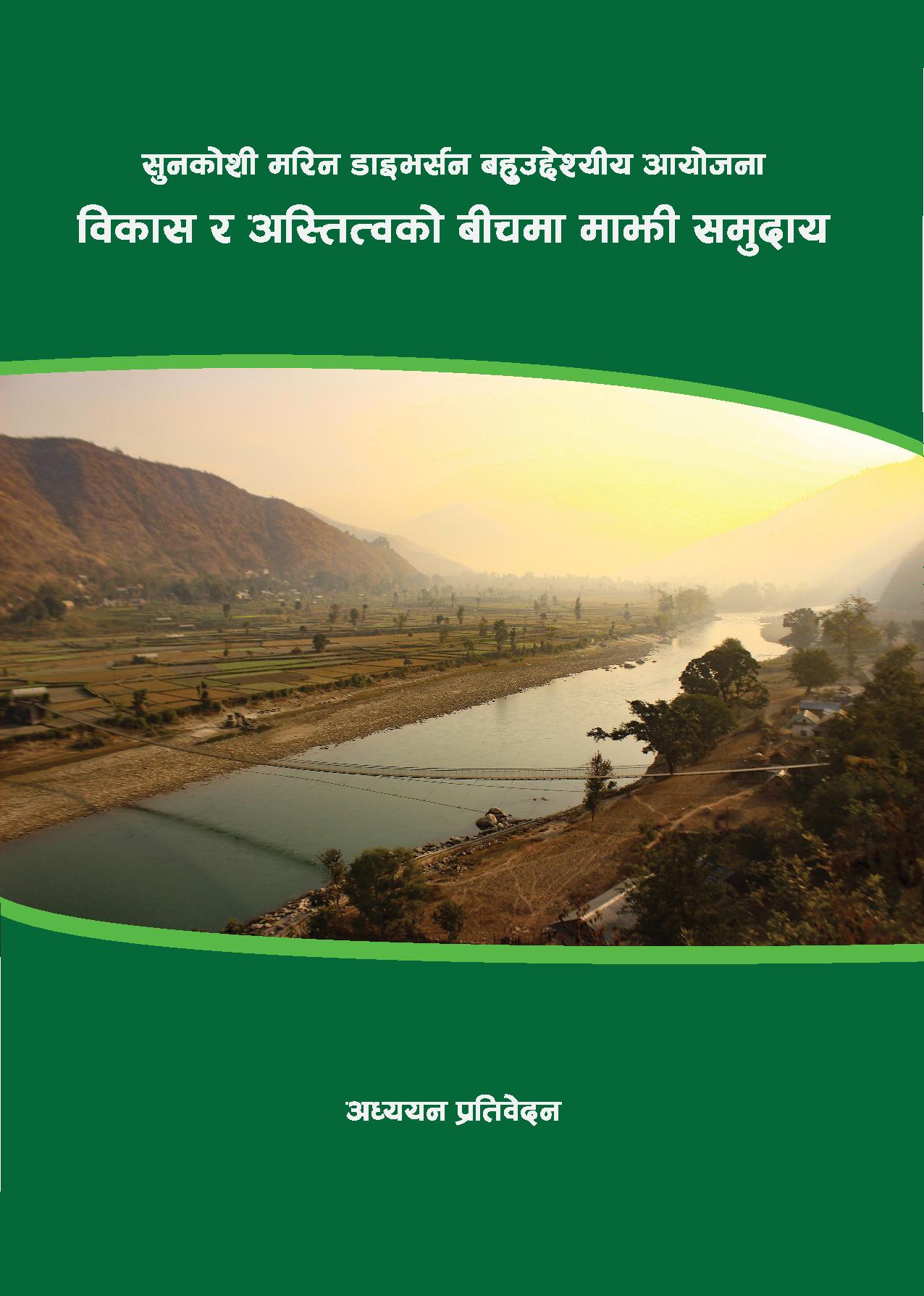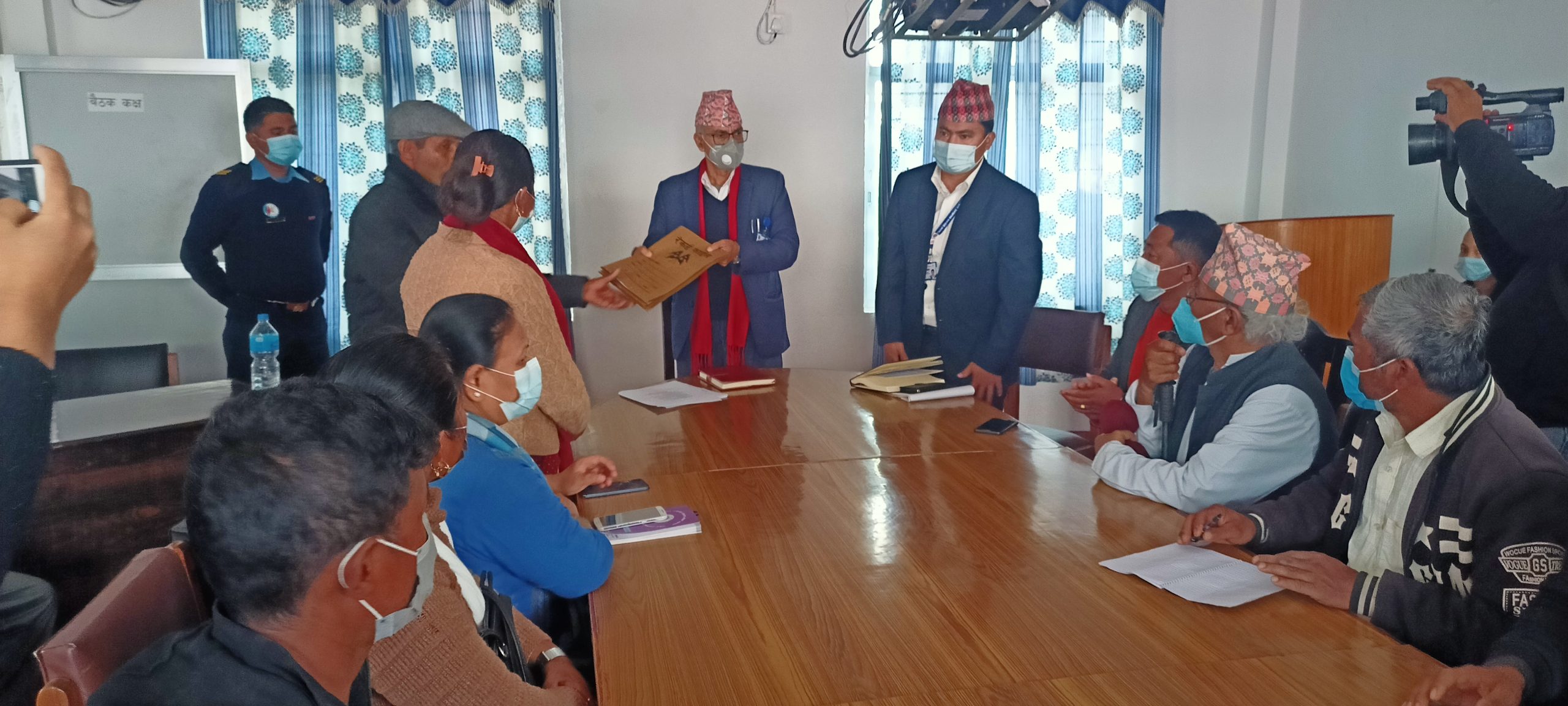Read below the CEMSOJ’s submission during the public consultation for the targeted update of the OECD Guidelines for Multinational Enterprises. The submission is based on CEMSOJ’s experience of using, or challenges thereto, the Guidelines while supporting a land rights advocacy campaign struggle to restore a historical pond and surrounding indigenous lands encroached by a recently built mega business complex called Chhaya Center that houses a local franchise of Marriott International in the tourist district of Kathmandu in Nepal. For more information about the campaign, see https://cemsoj.wordpress.com/tag/chhaya-center/.
more “CEMSOJ’s comments for the update of the OECD Guidelines for Multinational Enterprises”Category: Human Rights Advocacy
Nepal: Stop State brutality against the Indigenous Tamangs and other Locals for the construction of Tamakoshi-Kathmandu 220/400 kV Transmission Line Project in Shankharapur, Kathmandu
CEMSOJ joins organizations and individuals worldwide in the following public statement issued to the concerned authorities of Nepal and the Asian Development Bank (ADB).
Nepal: Stop State brutality against the Tamang Indigenous Peoples and Locals

Stop the construction of Tamakoshi-Kathmandu 220/400 kV Transmission Line Project in Shankharapur-3, Kathmandu
We, the undersigned organizations and individuals, strongly condemn the ongoing repression by Nepal’s police and armed police forces on the indigenous Tamang and other locals in Bojheni village, Shankharapur municipality Ward no. 3 in the northeast of Kathmandu for the construction of Tamakoshi-Kathmandu 200/400 kV Transmission Line and its substation.
more “Nepal: Stop State brutality against the Indigenous Tamangs and other Locals for the construction of Tamakoshi-Kathmandu 220/400 kV Transmission Line Project in Shankharapur, Kathmandu”Indigenous Newar communities in Khokana and Bungamati call for follow-up actions from UN experts in Geneva to protect their rights threatened by the construction of Fast Track Expressway and other infrastructure projects
10 July 2022, Kathmandu
Indigenous Newar communities – affected by the Kathmandu-Terai/Madhesh Fast Track (Expressway) Project and other ongoing or planned infrastructure and urbanization projects in historical settlements of Khokana and Bungamati in the south of Nepal’s capital city, Kathmandu – have called on four UN mechanisms in Geneva to take follow up actions for safeguarding their rights against the continued serious threats of displacement of the communities, violations of their land and resource rights as well as cultural rights and other impacts on them due to the ill-planned projects.
In separate letters emailed today to the UN Special Rapporteurs on the rights of indigenous peoples, on the right to adequate housing and on the situation of human rights defenders as well as the Working Group on business and human rights, two local groups (Janasarokar Samiti of Khokana and Bungamati) representing the affected communities have urged the UN mechanisms to jointly examine the information submitted and undertake follow up correspondence with the Government of Nepal to protect and promote the rights of the indigenous communities in the context of those projects. As stated in the letters, besides the Fast Track Expressway, other ongoing or planned projects, including Bagmati River Basin Improvement Project (Bagmati Corridor), Kathmandu Outer Ring Road and Thankot-Bhaktapur Transmission Line Project and one of the four “Smart Cities” proposed in Kathmandu valley, will entirely displace the indigenous communities from the historical settlements. Asian Development Bank has directly or indirectly supported many of those projects.
more “Indigenous Newar communities in Khokana and Bungamati call for follow-up actions from UN experts in Geneva to protect their rights threatened by the construction of Fast Track Expressway and other infrastructure projects”Tamakoshi-Kathmandu Transmission Line affected communities call on the Asian Development Bank to realign the power line and relocate its sub-station
3 November 2021, Kathmandu
Indigenous Tamang and other locals of Shankharapur municipality in the northeast of Kathmandu affected by the Tamakoshi-Kathmandu 200/400 kV Transmission Line and its Bojheni substation today submitted a memorandum to the Asian Development Bank (ADB) Nepal Resident Mission. They have called for realignment of the Transmission Line and shifting of the sub-station from their settlement area as planned under the ADB-financed Electricity Transmission Expansion and Supply Improvement Project.
In the memorandum emailed to the ADB with signatures of more than 200 affected locals, the Upper Tamakoshi Hydropower Project Victims’ Struggle Society has alleged that they have not been adequately informed about the impacts of the Transmission Line and the sub-station and the land acquisition has been undertaken through intimidation of the landowners. The construction of the Transmission Line and its sub-station has been halted for the last two years due to the opposition of the locals. They allege that the Project is seeking to construct the Bojheni substation in an unauthorized manner without agreement of the locals. Further, the Transmission Line running over their houses, lands and religious and cultural sites will devaluate their properties, significantly affect their livelihoods dependent on agriculture and tourism as well as the environment and even cause insecurity to their health and lives, which will eventually displace them from their ancestral lands and settlement.
more “Tamakoshi-Kathmandu Transmission Line affected communities call on the Asian Development Bank to realign the power line and relocate its sub-station”तामाकोशी-काठमाडौं प्रसारण लाइन पिडित समुदायद्वारा प्रसारण लाइन र त्यसको सबस्टेशन स्थानान्तरण गर्न माग गर्दै एसियाली विकास बैंकलाई ज्ञापनपत्र बुझाइयो
३ नोवेम्बेर २०२१ (वि. सं. २०७८ कार्तिक १७), काठमाडौँ
तामाकोशी–काठमाडौं २००/४०० के.भी. प्रसारण लाइन र त्यसको बोझेनी सवस्टेशनबाट पिडित काठमाडौंको उत्तरपूर्वस्थित शंखारापुर नगरपालिकाका आदिवासी तामांग र अन्य स्थानीयहरुले एसियाली विकास बैंक (एडीबी) को नेपाल आवासीय मिसनलाई आज ज्ञापनपत्र बुझाएका छन्। उनीहरुले एडीबीको सहयोगमा कार्यन्वयन भइरहेको Electricity Transmission Expansion and Supply Improvement Project अन्तर्गतको प्रसारण लाइन र त्यसको सवस्टेसन उनीहरुको बस्ती क्षेत्रबाट स्थानान्तरण गरी अन्तै सार्नको लागि आह्वान गरेका छन्।
२०० भन्दा बढी पिडित स्थानियहरुको हस्ताक्षर सहित एडीबीलाई ईमेल मार्फत बुझाइएको ज्ञापनपत्रमा अप्पर तामाकोसी जलविद्युत् परियोजना पिडित संघर्ष समाजले प्रसारण लाइन र सब स्टेशनको प्रभावबारे पर्याप्त जानकारी नगराएको र जग्गाधनीहरुलाई डर धम्की देखाई जग्गा अधिग्रहण गरिएको भनिएको छ। स्थानीयहरुको विरोधका कारण विगत दुई वर्षदेखि प्रसारण लाइन र सबस्टेसन निर्माणको काम रोकिएको छ। आयोजनाले स्थानीयको सहमतिविना अनधिकृत रुपमा बोझेनी सबस्टेसन निर्माण गर्न खोजेको उनीहरुको आरोप छ। यसबाहेक, उनीहरूको घर, जग्गा र धार्मिक तथा सांस्कृतिक स्थलहरू माथिबाट तानिने प्रसारण लाइनले उनीहरुको सम्पत्तिको अवमूल्यन हुने, कृषि र पर्यटनमा आश्रित उनीहरूको जीविकोपार्जन तथा वातावरणमा ठूलो असर पर्ने र उनीहरूको स्वास्थ्य र जीवनमा असुरक्षासमेत निम्त्याउने ज्ञापनपत्रमा भनिएको छ। फलस्वरूप, पिडित आदिवासी र स्थानीय समुदाय आफ्नो पुर्ख्यौली जग्गा जमिन र बासस्थानबाट विस्थापित गर्ने ज्ञापनपत्रमा उल्लेख छ।
more “तामाकोशी-काठमाडौं प्रसारण लाइन पिडित समुदायद्वारा प्रसारण लाइन र त्यसको सबस्टेशन स्थानान्तरण गर्न माग गर्दै एसियाली विकास बैंकलाई ज्ञापनपत्र बुझाइयो “Campaign to restore archaeological Kamal Pokhari in Thamel condemns Nepal government’s “irresponsible and false” reply to the UN mechanisms regarding rights infringed due to construction of Chhaya Center
Kathmandu, 11 October 2021
The Campaign to restore archaeological Kamal Pokhari in Thamel has condemned the “inadequate, irresponsible and false” reply provided by the Government of Nepal in response to the joint letter sent by four UN mechanisms to the Government concerning violations of the rights of indigenous Newars, including to their lands and resources and culture, due to construction of mega business complex Chhaya Center in Kathmandu.
As per the Campaign, the violations have occurred because a private Nepali company Chhaya Devi Complex Pvt. Ltd has constructed Chhaya Center, “the biggest business complex in Nepal’s history” after unlawfully acquiring the communal trust lands – traditionally holding a holy pond and its surroundings structures and areas – of the indigenous Pradhan Newar community in Kathmandu’s tourist district of Thamel. Despite local opposition and protests, including by human rights and cultural activists, the business complex officially opened in 2018 currently houses 200 retail stores, including high-end brand outlets, multiplex theatres, corporate offices, banquet and conference halls, casino, discotheque, etc., as well as a five-star hotel Aloft Kathmandu Thamel of the Marriott International, Inc.
more “Campaign to restore archaeological Kamal Pokhari in Thamel condemns Nepal government’s “irresponsible and false” reply to the UN mechanisms regarding rights infringed due to construction of Chhaya Center”Nepal’s indigenous Majhi communities demand cancellation of Sunkoshi-2 Hydropower Project
6 October 2021, Manthali/Kathmandu
Indigenous Majhi communities of Ramechhap and Sindhuli districts in eastern Nepal have demanded cancellation of Sunkoshi-2 Hydropower Project stating that the Project will result in large scale displacement of the Majhi communities and other locals and even wipe out the identity and existence of the Majhi people from their ancestral lands.
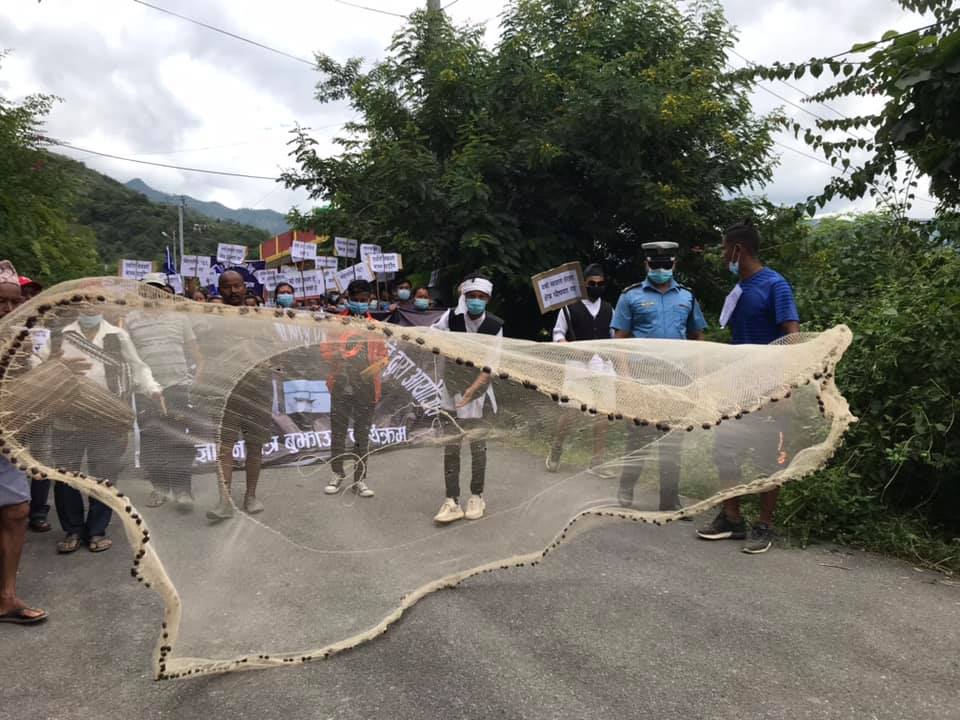
On Thursday (30 September), hundreds of Majhis from various villages of Ramechhap and Sindhuli districts clad in their indigenous attire took out a protest rally playing their traditional drums and musical instruments in Manthali – the district headquarter of Ramechhap. They carried boat- and fish-shaped placards and chanted slogans calling for, among others, annulment of the Sunkoshi-2 Hydropower Project, respect for their Free, Prior and Informed Consent (FPIC) and creation of an autonomous Majhi protected region. The Majhis led by the Sunkoshi-2 Hydropower Project Joint Struggle Committee also submitted their letter demanding cancellation of the Project to the Chief District Officer of Ramechhap, Dipak Kumar Pahadi, and the Mayor of Manthali Municipality, Ramesh Kumar Basnet. They assured the Majhi representatives that the local authorities were serious about their demand and that it will be conveyed to the concerned national authorities. Following submission of the demand letter, the rally converged into a corner assembly in Manthali town center, whereby the Majhi communities’ representatives and Committee officials relayed their concerns and demand.
more “Nepal’s indigenous Majhi communities demand cancellation of Sunkoshi-2 Hydropower Project”सुनकोशी मरिन डाइभर्सन बहुउद्देश्यीय आयोजनाबाट रामेछापको डुबान क्षेत्रका आदिवासी माझी र अन्य स्थानिय समुदायमा पर्ने असर सम्बन्धि अध्ययन प्रतिवेदन राष्ट्रिय मानवअधिकार आयोगमा पेश
२०७८ साउन १७
सुनकोशी मरिन डाइभर्सन बहुउद्देश्यीय आयोजनाबाट रामेछापको डुबान क्षेत्रका आदिवासी माझी र अन्य स्थानिय समुदायमा पर्ने असर र आयोजनाको सन्दर्भमा भएका राम्रा प्रयासहरु सम्बन्धि अध्ययनको प्रतिवेदन आज राष्ट्रिय मानव अधिकार आयोगमा पेश गरिएको छ ।
आयोजनाको मस्यौदा वातावरणीय प्रभाव मुल्यांकन प्रतिवेदन तथा अनलाइन र पत्रपत्रिकामा प्रकाशित सम्बन्धित समाचार र प्रसारित सामग्री लगायत अन्य सान्दर्भिक पुस्तक प्रतिवेदनको समिक्षा गर्दै २०७७ पुस ४ र माघ ३ गते क्रमशः रामेछाप जिल्लाको मन्थली नगरपालिका वडा नं ६, हात्तिटार र खाँडादेवी गाँउपालिका वडा नं ४, रजगाउँमा आयोजना प्रभावितहरुसंग गरिएका अन्तत्र्रिmया, छलफल र भिडियो अन्तर्वार्ता तथा प्रभावितहरुसँग गरिएको प्रभावित क्षेत्रको अवलोकनबाट संकलित जानकारीको आधारमा सो प्रतिवेदन तयार पारिएको हो । प्रतिवेदनमा आयोजनाबाट प्रभावितहरुको समितिमार्फत विभिन्न मितिमा सम्बन्धित निकायहरुमा १३ बुँदे मागसहितको ज्ञापनपत्र बुझाउँदा भएका अन्तरक्रियाको संस्लेषण तथा आयोजनाको सन्दर्भमा नेपालको हकमा लागु हुने सम्बन्धित राष्ट्रिय तथा अन्तराष्ट्रिय कानुन र अन्तर्राष्ट्रिय महासन्धिको कार्यान्वयन सम्बन्धी अनुगमन गर्ने समितिहरुले गरेका सिफारिसहरुको विश्लेषण पनि गरिएको छ ।
प्रतिवेदन बुझाउने क्रममा प्रभावित समुदायका काठमाडौंमा उपस्थित प्रतिनिधि र सम्बन्धित अधिकारकर्मीहरुले आयोजनाको सन्दर्भमा समुदायका गुनासो तथा प्रभावितहरुको संविधान प्रदत्त विभिन्न हक अधिकार र आदिवासी अधिकार उल्लंघन भएको जानकारी गराउँदै आयोगलाई स्थलगत भ्रमण तथा अन्य आवश्यक कदम चाल्न आग्रह गरेका थिए। आयोगका माननीय अध्यक्ष टोप बहादुर मगरले आयोगले प्रतिवेदनको अध्ययन गरी प्रभावित समुदायका समस्या समाधान गर्न कदम चाल्ने आश्वासन दिनुभएको थियो ।
more “सुनकोशी मरिन डाइभर्सन बहुउद्देश्यीय आयोजनाबाट रामेछापको डुबान क्षेत्रका आदिवासी माझी र अन्य स्थानिय समुदायमा पर्ने असर सम्बन्धि अध्ययन प्रतिवेदन राष्ट्रिय मानवअधिकार आयोगमा पेश”Nepal’s govt ignores UN experts’ letters concerning alleged violations of indigenous Newar rights in the construction of the Kathmandu-Terai/Madhesh Fast Track Expressway and of the Chhaya Center business complex
On 30 March 2021, UN experts sent a letter to the Government of Nepal regarding alleged violations of the rights of indigenous Newar peoples over their lands, resources and over the loss of religious and cultural sites in the context of the construction of the Terai/Madhesh FastTrack Expressway and the construction of the Chhaya Center business complex in the tourist district of Thamel in Kathmandu.
The Working Group on the issue of human rights and transnational corporations and other business enterprises; and three Special Rapporteurs on adequate housing as a component of the right to an adequate standard of living, on the situation of human rights defenders and on the rights of indigenous peoples of the UN had sent the letter requesting a response from the government. However, the government has disgracefully ignored the letter and not sent any reply even within the period of 60 days as provided in the letter.
The allegation letter is available at the link https://spcommreports.ohchr.org/TMResultsBase/DownLoadPublicCommunicationFile?gId=26282.
more “Nepal’s govt ignores UN experts’ letters concerning alleged violations of indigenous Newar rights in the construction of the Kathmandu-Terai/Madhesh Fast Track Expressway and of the Chhaya Center business complex”सुनकोशी मरिन डाइभर्सन बहुउद्देश्यीय आयोजना प्रभावित रामेछापका आदिवासी माझी र अन्य समुदाय असन्तुष्ट: जिल्ला प्रशासनलगायत स्थानीय निकायहरुमा १३ बुँदे मागसहित ज्ञापनपत्र बुझाए
१८ जनवरी २०२१ (वि. सं. ५ माघ २०७७), मन्थली, रामेछाप
सुनकोशी मरिन डाइभर्सन बहुउद्देश्यीय आयोजनाबाट रामेछापका आदिवासी माझी र अन्य स्थानीय बासिन्दाले आयोजना सम्बन्धि प्रभावितलाई पर्याप्त जानकारी नदिइएको, अर्थपूर्ण परामर्श नगरिएको र जग्गा अधिग्रहणलगायत आयोजनाका निर्णयमा प्रभावितसँग सहमति नभएको भन्दै जिल्ला प्रशासन लगायतका स्थानीय निकायहरुमा १३ बुँदे मागसहित ज्ञापनपत्र बुझाएका छन्।
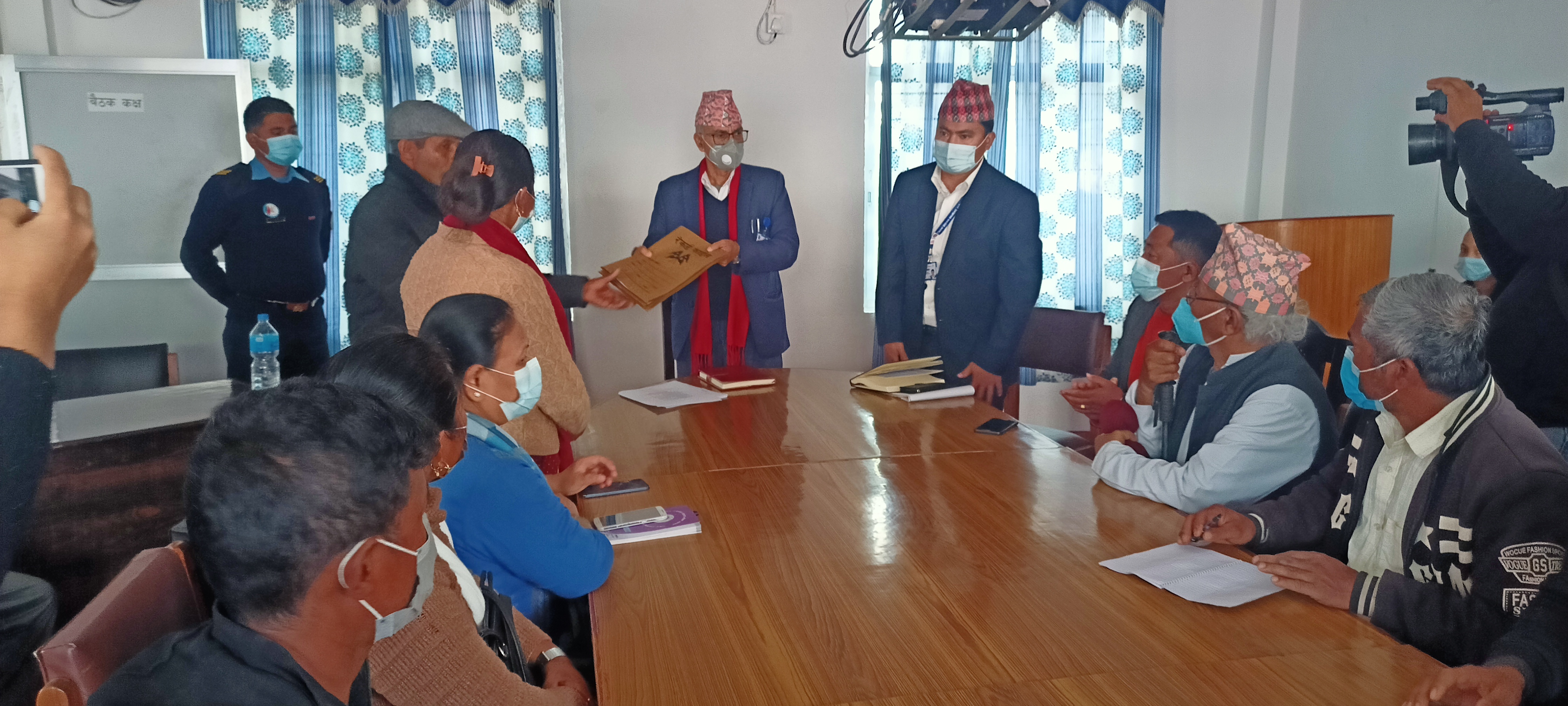
रामेछाप जिल्लामा पर्ने आयोजनाको डुबान क्षेत्रका ६ गाउँबस्तीका ३०० भन्दा बढी प्रभावितहरुको हस्ताक्षरसहित सुनकोशी मरिन डाइभरसन बहुउद्देश्यीय परियोजना प्रभावित समितिले आइतबार जिल्ला प्रशासन कार्यालय, मन्थली नगरपालिका, खाँडादेवी गाउँपालिका, मालपोत कार्यालय लगायत जिल्लाका प्रतिनिधि सभा र प्रदेश सभा सदस्यहरुलाई पनि ज्ञापनपत्र बुझाएको हो। साथै, जिल्ला प्रशासन कार्यालयमार्फत उर्जा, जलस्रोत तथा सिँचाई मन्त्रालय र प्रधानमन्त्री तथा मन्त्रीपरिषद्को कार्यालयमा पनि ज्ञापनपत्र पठाइएको छ।
सुनकोशी नदीको पानी मरिन खोलामा झारी बागमती नदीको सिंचाई मार्फत् तराईका ५ जिल्लाका १,२२,००० हेक्टर जमिनमा सिंचाई सुविधा पु¥याउन राष्ट्रिय गौरवको परियोजनाको रुपमा निर्माणाधीन सुनकोशी मरिन डाइभर्सन बहुउद्देश्यीय आयोजनाबाट आदिवासी माझी र अन्य स्थानीय समुदायले परम्परादेखि भोगचलन गर्दै आएको पुख्र्यौली जग्गा जमिन, नदी खोला र बगरक्षेत्र, घाट, आदि डुबानमा पार्ने र त्यसबाट माझी र अन्य स्थानीय विस्थापित हुने, कृषि गर्ने, माछा मार्ने, डुंगा चलाउनेलगायतका तिनको जिविकोपार्जनबाट वञ्चित हुने र तिनको धार्मिक, साँस्कृतिक र सामाजिक जीवनमा प्रतिकुल असर पर्ने ज्ञापनपत्रमा भनिएको छ।
डुबान क्षेत्रमा बसोवास गर्ने मध्ये करिब ९० प्रतिशत अति सिमान्तकृत माझी समुदायका छन् । तर माझी समुदायको प्रभावकारी प्रतिनिधित्वबिना निर्धारण गरिएको डुबान क्षेत्र र नेपाल सरकारबाट २०७७/५/२८ गते प्रकाशित जग्गा प्राप्ति सम्बन्धी सूचनाबारे प्रभावित समुदायमा अन्यौल रहेको र तिनको प्रतिनिधित्वबिना मुआब्जा निर्धारण समितिबाट तय गरिएको मुआब्जाको दररेटमा पनि तिनको असहमति रहेको ज्ञापनपत्रमा उल्लेख छ।
प्रभावित समुदायका निम्नानुसारका १३–बुँदे माग रहेको भन्दै ती मागहरुको सम्बोधन गर्न १५ दिनभित्र ठोस कदम नचालिएको खण्डमा प्रभावित समुदायले चरणबद्ध आन्दोलन गर्ने जनाएको छ।
१. सुनकोशी मरिन दाइभर्सन बहुउद्देश्यीय आयोजना सम्बन्धि वातावरणीय प्रभाव मूल्यांकन प्रतिवेदन लगायतका जानकारी प्रभावित समुदायले बुझ्ने भाषा र रुपमा उपलब्ध गर्नुपर्ने ।
२. प्रभावित आदिवासी माझी र अन्य समुदायसँग अर्थपूर्ण परामर्श गरी आयोजनाबाट समुदायलाई असर पर्ने निर्णयहरुमा प्रभावित समुदायको स्वतन्त्र, अग्रिम र सुचित मन्जुरी (Free, Prior and Informed Consent – FPIC) लिनुपर्ने ।
३. आयोजनाबाट लालपुर्जा भएको वा नभएको घरजग्गासहित नदी बगर र समुदायको अन्य भूमि र श्रोतसाधनमा पर्ने असर र जग्गा अधिग्रहणको विषयमा प्रभावित समुदायमा अन्यौल र असहमति रहेको हुँदा आयोजनाले असर गर्ने वा अधिग्रहण गरिने घरजग्गा र जमिनको बारेमा सम्बन्धित समुदायको सहभागितामा पुनः फिल्ड सर्भे (field survey) गरी उचित मुवाब्जा तथा क्षतिपूर्ति निर्धारण गर्नुपर्ने । विशेषतः मुआब्जा निर्धारण समितिमा प्रभावित प्रभावित समुदायकै प्रतिनिधित्व हुनुपर्ने ।
४. घरजग्गा अधिग्रहण गर्नै पर्ने भए प्रभावित परिवारको इच्छाअनुरुप अधिग्रहण गरिने घरजग्गाको मुआब्जाको लागि समान प्रकृति र मूल्यको घरजग्गा सट्टामा दिने व्यवस्था गर्नुपर्ने । त्यसरी नै प्रभावित आदिवासी माझी समुदायले परम्परादेखि भोगचलन गरि आएको लालपुर्जा नभएको घरजग्गा, गोठ, जमिन र श्रोतसाधनको पनि उचित व्यवस्था हुनुपर्ने ।
५. अध्रिग्रहण गरिने घरजग्गा, जमिन डुबानमा नपरेसम्म प्रभावित समुदायले प्रयोग गर्न पाउनुपर्ने र डुबानबाट प्रभावित हुने बाली, रुखबिरुवाको पनि उचित क्षतिपूर्ति दिइनुपर्ने ।
६. प्रभावित क्षेत्रको प्रत्येक घरपरिवारलाई आयोजनामा सिप र क्षमताको आधारमा एक घर एक रोजगारीको व्यवस्था गर्नुपर्ने । ती प्रभावितको क्षमता बढाउन आयोजनाबाट निशुल्क तालिम व्यवस्था हुनुपर्ने ।
७. आयोजनालाई कम्पनीमा लगी प्रभावित आदिवासी माझी र प्रभावित स्थानीय बासिन्दालाई निशुल्क आयोजनाको शेयर र त्यसबाट उत्पादन हुने बिजुली वितरण गरिनुपर्ने ।
८. आयोजनाको सामुदायिक विकास कार्यक्रम अन्तर्गत प्रभावित क्षेत्रका स्थानीय सरकारलाई दिइने रकम बिशेष गरी प्रभावित आदिवासी माझी र स्थानीय समुदायको हित हुने कार्यक्रममा ती समुदायकै सहभागितामा प्रयोग गर्नुपर्ने । विशेषतः डुबान क्षेत्रमा शिक्षा, स्वास्थ्य, यातायात, विद्युत्, खानेपानी, संचारलगायतका विकासका पूर्वाधार निर्माण गरिने नमुना वस्ती विकास गरिनुपर्ने । साथै डुवानक्षेत्र वरिपरि रहेका गाउँबस्ती, जग्गाजमिन, विद्यालय लगायतका भौतिक पुर्वाधारको सुरक्षाको लागि आवश्यक सर्वेक्षण गरी पक्की पर्खाल निर्माण गरी संरक्षण गरिनुपर्ने ।
९. आयोजनाबाट स्थानीय र प्रदेश सरकारलाई प्राप्त हुने २५/२५ प्रतिशत राजस्व प्रभावित आदिवासी जनजाति माझी र स्थानीय समुदायको हितको लागि प्रभावित समुदायकै सहभागितामा प्रयोग गरिनुपर्ने ।
१०. आयोजनाबाट बन्ने जलाशयमा प्रभावित आदिवासी माझी समुदायको परम्परागत सिप र जीविकोपार्जनको संरक्षण हुने गरी प्रभावित माझीहरुकै स्थानीय समितिमार्फत पर्यटकीय र डुंगा चलाउने कार्यक्रमहरु संचालन गर्नुपर्ने र त्यसको लागि सरकारले आवश्यक सहयोग गर्नुपर्ने ।
११. आयोजनाबाट प्रभावित आदिवासी माझी समुदायका घाटहरु (डुंगा तार्ने र जात्रा गर्ने स्थान) डुवानमा पर्ने लगायत तिनको संस्कृतिमा गम्भीर नकारात्मक असर पर्ने कुराको मूल्यांकन नभएको हुँदा प्रभावित समुदायकै सहभागितामा सांस्कृतिक प्रभाव मूल्यांकन गरिनुपर्ने । आयोजनाबाट समुदायकै सहभागितामा माझी जातिको संस्कृति, भाषा र भेषको जगेर्ना गर्न कार्यक्रम कार्यान्वयन पर्ने । विशेषतः माझीहरुको पितृ चढाउने स्थल, माछा मार्ने ठाउंको व्यवस्था गरिनुपर्ने । साथै मठमन्दिर, धार्मिकस्थल, पाटीपौवा लगायत सार्वजनिक स्थलको उचित संरक्षण र विकास गरिनुपर्ने ।
१२. आयोजनाबाट प्रभावित क्षेत्रका महिला, बालबालिका, ज्येष्ठ नागरिकको संरक्षण र विकासको लागि विशेष कार्यक्रम ल्याउनुपर्ने ।
१३. आयोजनाको कार्यन्वयनको क्रममा आदिवासी अधिकार सम्बन्धि अन्तर्राष्ट्रिय श्रम संगठनको महासन्धि १६९ लगायत अन्य अन्तर्राष्ट्रिय कानुन बमोजिम आदिवासी माझी र स्थानीय समुदायको अधिकार सुनिश्चित गरिनुपर्ने । विशेषतः स्थानीय श्रोतसाधनमा प्रभावित आदिवासी माझीको विशेष अधिकार कायम हुनुपर्ने ।
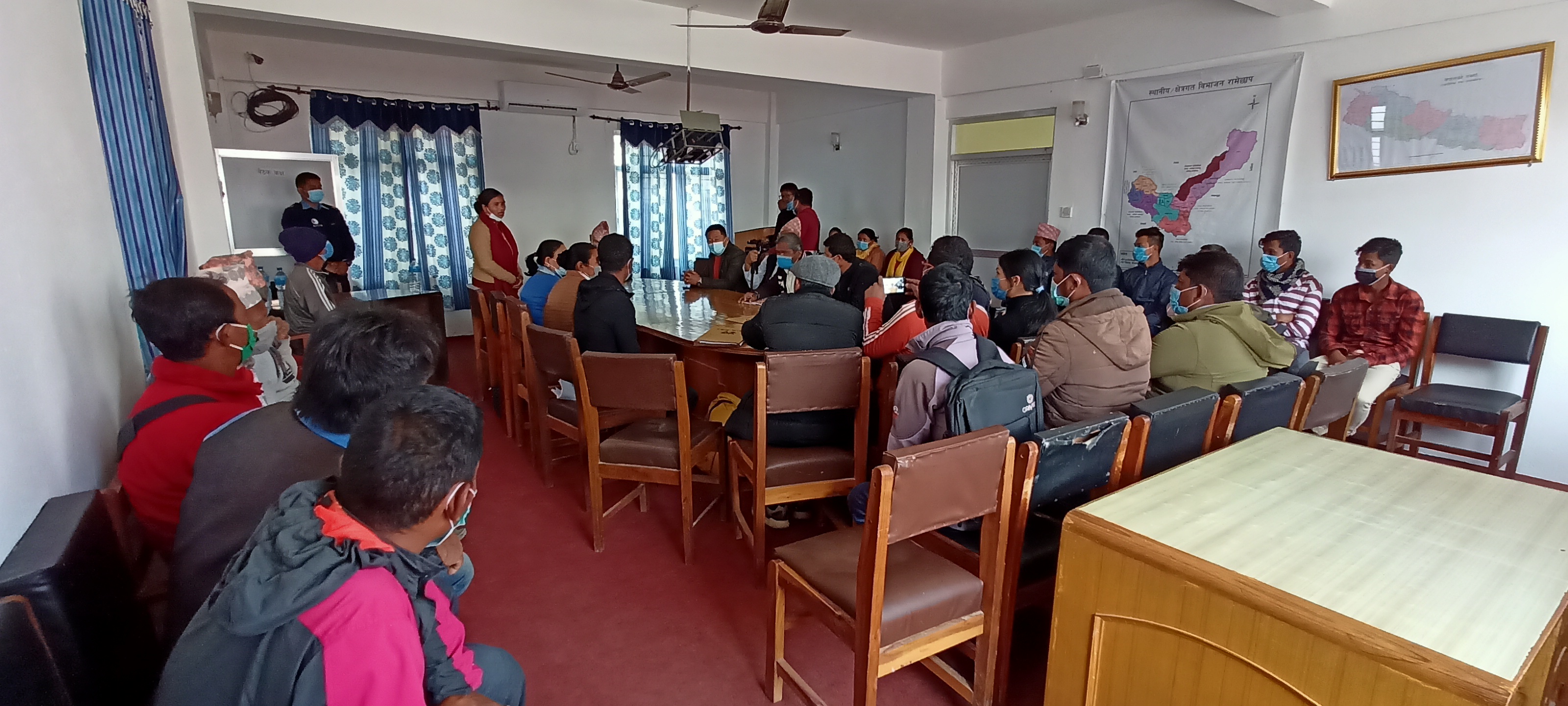
रामेछाप जिल्ला प्रशासन कार्यालयमा बुझाइएको ज्ञापनपत्र पूरा पढ्न यहाँ क्लिक गर्नुहोस्।
